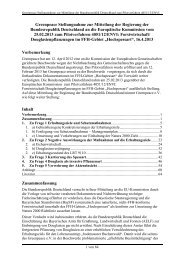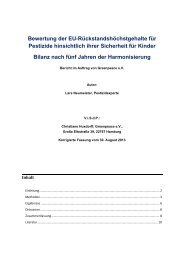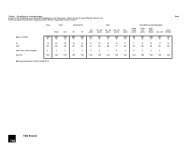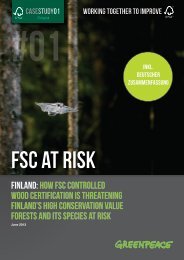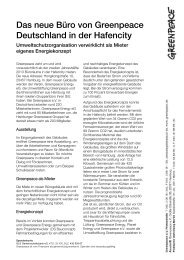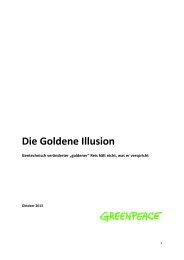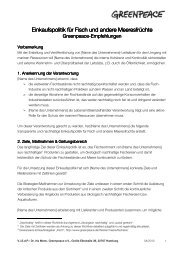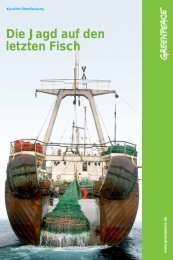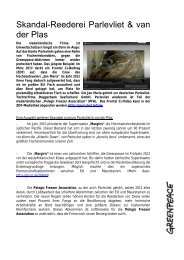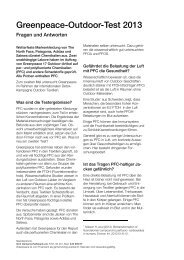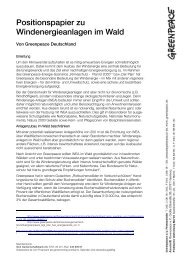Consuming Canada's Boreal Forest: The chain of ... - Greenpeace
Consuming Canada's Boreal Forest: The chain of ... - Greenpeace
Consuming Canada's Boreal Forest: The chain of ... - Greenpeace
Create successful ePaper yourself
Turn your PDF publications into a flip-book with our unique Google optimized e-Paper software.
32<br />
Quebec’s<br />
René Levasseur<br />
Island Gets<br />
Trashed<br />
<strong>Greenpeace</strong><br />
Kruger<br />
Total Revenue: CDN$2.6 billion (US$2.3 billion) (2005) 6<br />
Head Office:<br />
Kruger<br />
3285 chemin Bedford<br />
Montreal, Quebec, Canada H3S 1G5<br />
Telephone: (514) 737-1131<br />
Fax: (514) 343-3124<br />
www.kruger.com<br />
CEO and Chairman: Joseph Kruger II<br />
Kruger is a private company without shareholders and<br />
as such not listed on any stock markets. It is owned<br />
by the Kruger family and was founded by Joseph<br />
Kruger in 1904. Joseph’s grandson, Joseph Kruger II,<br />
has been serving as chairman <strong>of</strong> the Board and CEO<br />
for over 20 years.<br />
Today, Kruger is a major forest products company<br />
engaged in the manufacturing and sale <strong>of</strong> newsprint,<br />
specialty papers, lightweight coated paper, directory<br />
paper, tissue, recycled linerboard, corrugated containers,<br />
lumber and other wood products. Kruger has<br />
operations in the Canadian provinces <strong>of</strong> Quebec,<br />
Ontario, Alberta, British Columbia, and Newfoundland<br />
and Labrador, as well as the United States and the<br />
United Kingdom. Kruger employs over 10,500 people.<br />
Products: Kruger produces 1.6 million tonnes <strong>of</strong><br />
paper annually out <strong>of</strong> mills located in Bromptonville and<br />
Trois-Rivières, Quebec; Cornerbrook, Newfoundland; and<br />
Manistique, Michigan. In 2001, 84 per cent <strong>of</strong> the production<br />
went to the United States, 6.5 per cent to Europe,<br />
6 per cent to Asia, and 3 per cent to Latin America. 7<br />
<strong>The</strong> Tissue Group division <strong>of</strong> Kruger includes four<br />
Scott Paper mills and converting facilities in Canada,<br />
and markets products under a number <strong>of</strong> highly recognizable<br />
brands, including Cashmere, Purex, Scotties,<br />
ScotTowels, White Cloud, and White Swan.<br />
Logging Activity: Less than 48 per cent <strong>of</strong> the total<br />
area under Kruger management in Quebec and Ontario<br />
remains intact. Kruger is involved in severe controversy<br />
on the Island <strong>of</strong> René-Lavasseur, where logging is carrying<br />
on not only in intact forest areas but also in<br />
important caribou habitat and without respect for the<br />
rights <strong>of</strong> traditional land owners, the Innu <strong>of</strong> Pessamit.<br />
None <strong>of</strong> Kruger’s forested lands is certified to the<br />
standards <strong>of</strong> the <strong>Forest</strong> Stewardship Council.<br />
SFK Pulp<br />
Total Revenue: CDN$236 million (US$212 million) (2006)<br />
Head Office:<br />
SFK Pulp Fund<br />
4000 Saint-Eusebe Road<br />
Saint-Félicien, Quebec, Canada G8K 2R6<br />
Phone: (418) 679-8585<br />
Fax: (418) 679-7371<br />
www.sfk.ca<br />
SFK.UN (Toronto), SFK.DB (Toronto)<br />
CEO & President: André Bernier<br />
SFK Pulp is one <strong>of</strong> lowest-cost northern bleached s<strong>of</strong>t<br />
kraft (NBSK) pulp producers in North America, producing<br />
375,000 tonnes annually. Originally owned by Donohue,<br />
SFK was spun <strong>of</strong>f from Abitibi-Consolidated in 2002.<br />
Abitibi fully divested in February 2004.<br />
Since 2002, a 20-year fibre supply agreement has<br />
been in place between Abitibi and SFK: Abitibi supplies<br />
nearly all <strong>of</strong> SFK’s wood chips for pulp manufacture,<br />
worth nearly CDN$92 million (US$83 million), and<br />
in turn it also buys some <strong>of</strong> SFK’s pulp.<br />
Logging Activity: Though SFK Pulp does not itself<br />
log forests, as one <strong>of</strong> the largest customers <strong>of</strong> Abitibi-<br />
Consolidated and recently owned by that company,<br />
it has a considerable impact on the <strong>Boreal</strong> <strong>Forest</strong> in<br />
Quebec. Most <strong>of</strong> the chips that Abitibi-Consolidated<br />
supplies under its 20-year fibre supply agreement with<br />
SFK Pulp originate in intact forest areas in the Lac St-Jean<br />
region <strong>of</strong> Quebec located 500 km (310 miles) northeast<br />
<strong>of</strong> Montreal. SFK also receives chips from<br />
Bowater and Kruger.<br />
<strong>The</strong> beautiful, pristine old-growth forests <strong>of</strong> René Levasseur Island are being clearcut by Kruger. Covering over<br />
240,000 hectares (593,000 acres) four times the size <strong>of</strong> the city <strong>of</strong> Toronto, René Levasseur is home to various animal<br />
and plant species, many <strong>of</strong> them rare and endangered, including woodland caribou, American marten, black-backed<br />
woodpecker, three-toed woodpecker, Canadian lynx, wolf, and wolverine. <strong>The</strong> island was formed by a meteorite five<br />
kilometers (three miles) across that struck the earth 214 million years ago, and is the fourth-largest impact crater found<br />
anywhere on the earth.<br />
René Levasseur Island has been proposed as a national park <strong>of</strong> Canada (twice), as an ecological reserve, and as an<br />
exceptional geological site, and was included in a proposed world biosphere reserve project, All <strong>of</strong> these proposals<br />
aimed to protect the Island from shore to shore. It is also the part <strong>of</strong> the ancestral territory <strong>of</strong> the Innu First Nations’<br />
community <strong>of</strong> Pessamit.<br />
<strong>The</strong> Innu <strong>of</strong> Pessamit have pledged to keep René Levasseur pristine and intact, and have taken the Quebec government<br />
and the logging company Kruger to the province’s highest court in order to have their ancestral rights recognized.<br />
This litigation is currently ongoing (at time <strong>of</strong> publication). Kruger has proposed logging 80 per cent <strong>of</strong> the island.<br />
<strong>Consuming</strong> <strong>Canada's</strong> <strong>Boreal</strong> <strong>Forest</strong>: <strong>The</strong> <strong>chain</strong> <strong>of</strong> destruction from logging companies to consumers



